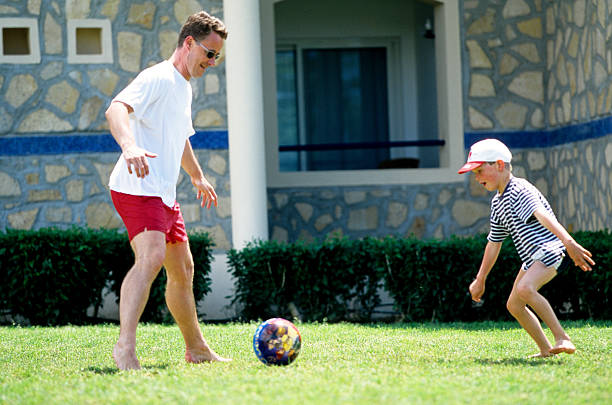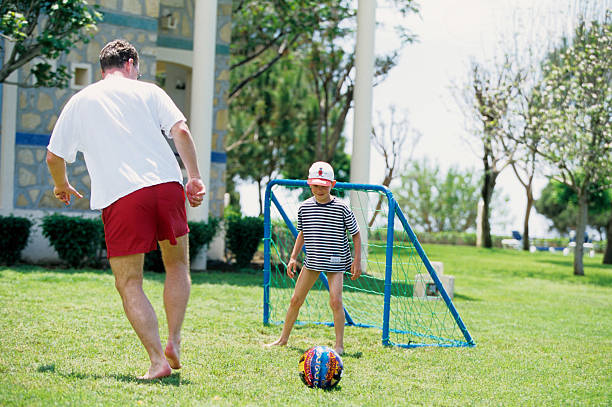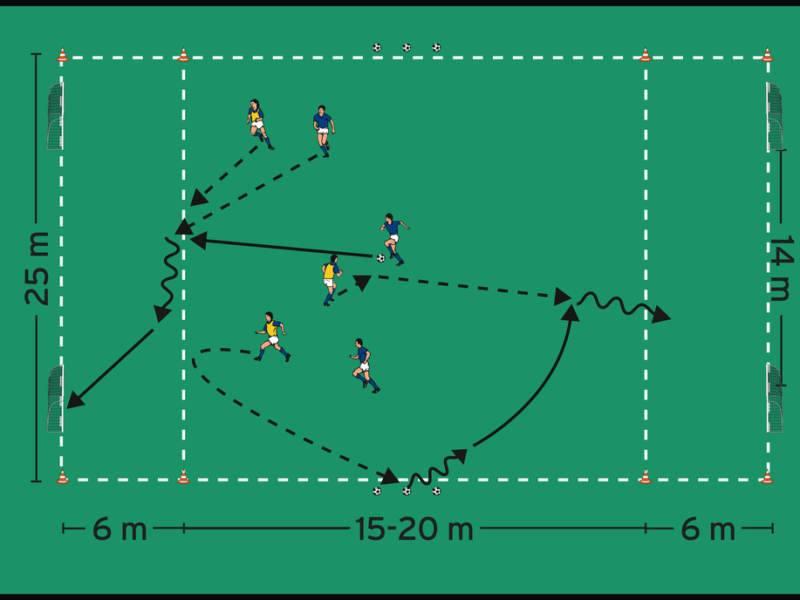As a soccer parent, you’ve probably done it all. Rushed out the door with cleats in one hand and snacks in the other, driven for hours to watch a 30-minute game, braved the cold or sun cheering your lungs out, and endured every emotional rollercoaster as if you were the one out there on the field.
You’re already invested. You already care about it. But maybe, you wonder if you can do better. If you can be there, more present.
If you can be the type of soccer parent who makes a difference, that is not only on the game itself, but on your child’s attitude, self-esteem, and passion for the game.
Because it’s not all about shuttling them to practices or cheering from the sidelines. Being a soccer parent can be so much more if you let it.
You can encourage, inspire, and motivate your child in ways that go so far beyond the field.
This is not about becoming a personal trainer or being perfect. It’s about being a journey companion.
A steady source of encouragement.
The voice that lifts, not pushes.
A calm presence when things are messy, and a celebrator of the little wins that people might overlook.
CHECK OUT | How to Build Confidence on the Soccer Field
1. Understand Your Role (It’s Not Coach, Ref, or Agent)

It’s tempting, isn’t it? You see the game unfolding. Maybe your kid’s out of position, the ref makes a call you disagree with, or the coach’s decision doesn’t make sense.
You want to say something. But hold up. Your role is not to coach from the sidelines, argue with refs, or question every substitution.
Your real role is about emotional safety, encouragement, and being the calm when everything else is chaotic.
Be their rock, not their stress.
Your child should look to you and feel safe, win or lose, good game or bad. That’s what they need most. That’s what sets you apart from just any other soccer parent on the sidelines.
2. Learn the Game (Yes, You Too)
Even if you’ve never played a second of soccer, you can still learn the basics. Understanding formations, positions, and rules can help you engage more meaningfully with your child’s experience.
Start with the simple stuff:
- What’s offside?
- What’s a handball?
- What’s your kid’s position supposed to do?
Ask your child to explain these things to you, trust me, they’ll love teaching you something for once. It also shows them that what they’re passionate about matters to you.
3. Create a Safe Space to Talk About the Game
“Did you win?” is often the first thing parents ask. But you can rephrase the question in such a way to make them feel comfortable:
- “How did the game go?”
- “What went well?”
- “Anything you wish you did differently?”
These open-ended questions invite conversation. They let your child reflect and process. And sometimes they just want to vent or celebrate or shrug it off.
Don’t make every car ride home a post-game analysis.
Let them lead. If they want to talk, listen. If they don’t, that’s okay too.
4. Focus on the Effort, Not the Outcome
This can’t be said enough.
Don’t praise the goal. Praise the hustle that led to the goal. Don’t hype the win. Hype the teamwork, the positioning, the resilience.
Kids are smart.
They know when praise is conditional. They know if they play badly and you’re suddenly quiet on the ride home. Don’t tie your energy to their performance.
Your message should always be:
“I love watching you play.”
No strings attached.
5. Model Healthy Behavior – Especially on the Sidelines
You want your child to respect the referees? Then don’t scream at them. You want them to handle losses with grace? Don’t slam your chair and storm off when they lose.
Kids watch everything.
Be the calm. Be the cheerleader. Be the voice of support, not the one making the sidelines uncomfortable.
Pro tip: If you find yourself getting too heated during games, take a few steps back. Bring headphones. Breathe. Your child doesn’t need perfection, just presence.
CHECK OUT | Can You Play Soccer if You Have Asthma?
6. Support Their Dreams—But Let Them Lead
Maybe your kid wants to go professional. Maybe they don’t. Maybe they love soccer today and feel burned out next season. And that’s okay.
Your job is not to push the dream, it’s to support it.
Talk to them about their goals. Listen when they shift. Encourage them to dream big but remind them that they’re more than just an athlete.
Be flexible. Be patient. Be there when they fall out of love with the game, and when they fall back in.
7. Celebrate the Small Wins

That great first touch. That recovery run. That brave moment when they tried a new move. These things matter just as much, sometimes more than a goal or assist.
Highlighting these moments shows your child that you see them. Not just the scoreboard. Them.
8. Build Healthy Routines Around the Sport
Being a soccer parent doesn’t end when the final whistle blows. It means:
- Helping them fuel properly
- Ensuring they get good sleep
- Keeping up with homework and balance
- Supporting recovery when they’re sore or injured
You’re not just managing a schedule—you’re supporting a lifestyle.
And when done right, this teaches responsibility, time management, and self-care all through the lens of something they love.
CHECK OUT | Can You Play Soccer With Glasses?
9. Get Involved—but Not Over-Involved

Soccer parents are the unsung heroes: organizing snacks, rides, team parties, and fundraising. If you’re able to contribute, your help is always appreciated.
There’s a line between being involved and being too involved. Don’t be the parent who overshadows the coach or speaks over other kids.
Ask:
“How can I help the team today, not just my kid?”
When your child sees you supporting the group, not just them, it teaches humility and community.
10. Handle Setbacks with Compassion, Not Panic
Bad games happen. So do injuries. So do moments when your kid thinks, “I’m not good enough.”
This is when you shine. Not with lectures. Not with “You just need to work harder.” But with:
- “I saw how hard you tried today.”
- “That must have felt frustrating, want to talk about it?”
- “You’re allowed to have off days.”
Be the safety net, not the pressure.
11. Help Them Fall in Love with the Game
Watch professional games together. Show them old highlight reels. Play in the backyard.
Laugh.
Be silly.
Be unskilled.
Be curious.
Let soccer be something you share, not something you manage.
When you participate out of joy, not expectation, you help them remember why they started in the first place.
CHECK OUT | Best Stores to Buy Soccer Jerseys in New York
12. Teach Them to Respect Everyone on the Field
From the referee to the water boy, from the striker to the sub who didn’t play a single minute, respect matters.
Model that. Talk about it.
If your child complains about another player, guide the conversation toward empathy. If they’re benched, help them focus on how to be a great teammate anyway.
Respect isn’t just part of the game. It’s part of life.
13. Protect Their Passion from Burnout
Extra clinics, travel teams, private coaches, they all have their place. But too much, too fast can steal the joy.
Check in often.
Not just with, “How’s your ankle?” but “Are you still having fun?”
If they’re dreading practice or overwhelmed by pressure, listen. Pull back if needed. Their mental health comes first: always.
14. Stay Grounded—This Is Their Journey

As a soccer parent, it’s easy to get wrapped up. To dream about scholarships. To want your child to be the next Messi. To compare them to that other kid on the team.
Pause.
This is their journey. Their timeline. Their game.
You get to walk beside them. Cheer them on. Pick them up. But the path? That’s theirs to walk.
Your job?
Make it feel supported, loved, and never alone.
CHECK OUT | 13 Simple Ways to Prevent Blisters When Wearing Soccer Cleats
Final Whistle – Soccer Parent
Be it your child goes pro or plays for fun, the values you help them build will last a lifetime.
- Resilience from tough losses.
- Joy from simple wins.
- Confidence from unconditional love.
- Respect for the game.
You’re not just there for the game, you’re there for the growth.
So show up. Cheer loud (but respectfully). Love hard. And always remind them:
“I love watching you play.”
No matter what.



